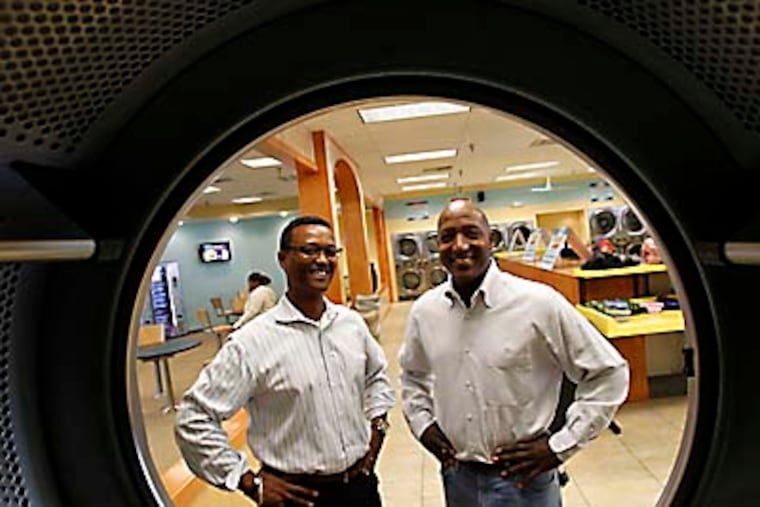Ronnie Polaneczky: How a Laundromat gives this neighborhood a prayer
THE DAY they opened The Laundry Cafe in Olney, owners Tyrone Akins and Brian Holland were approached by an older woman with an unexpected request.

THE DAY they opened The Laundry Cafe in Olney, owners Tyrone Akins and Brian Holland were approached by an older woman with an unexpected request.
She had inspected the Laundromat's 150 high-end washers and dryers, granite-topped tables and coin-operated massage chairs.
She had marveled at the low-fee computer stations, Starbucks coffee kiosk, digital jukebox, video games, free Wi-fi and flat-screen TVs.
She made note of The Laundry Cafe's complimentary curbside assistance, first-load-free dryer service and bright community room where classes would be offered, free, on topics like how to start your own business.
Basically, she had never seen anything as fabulous as The Laundry Cafe in the un-fabulous neighborhood and no-frills strip mall - 1 Olney Plaza at North Front Street and Olney Avenue - where it opened for business in April.
And she was afraid it would all go to hell.
"She said to us, 'This place is gorgeous. I hope they don't tear it up,' " recalls Akins.
By "they," she meant the vandals in lower-income communities who have a way of ruining nice things that law-abiding residents of the community deserve to enjoy just as much as law-abiding residents in a higher-income neighborhood would.
And so she made her request.
"She said, 'Would you mind if I walked around and prayed for this place?' " recalls Akins, eyes wide. "We said, 'Of course you can! We would welcome that!' And she walked around, very quietly, praying for our success. It was phenomenal! We have been riding on a train of grace and mercy ever since."
I never thought I'd use this column to write about a Laundromat's success. Or that the column would be sprinkled with words like "grace," "mercy" and "fabulous." But something other than Starbucks coffee is brewing at The Laundry Cafe, and it says a lot about community, expectations and - dare I say this? - love.
But let's first talk about owners Akins and Holland, who met while working together at Johnson & Johnson - Akins in marketing, Holland in sales. Both were deeply affected by the company's famous credo of responsibility to customers, employees, communities and stockholders.
So when they decided to go into business together - "Laundry is practically recession-proof," says Akins, "since people will always need clean clothes" - they wrote their own credo, which is printed on their business cards:
"Serve with honor. Grow with humility. Live with respect. Repay with generosity."
The men, who grew up poor, had seen little of those virtues in the dark, dingy and depressing Laundromats their families once used.
Akins, 48 and single, was raised in Newark, N.J., by his mother, who worked multiple jobs to make ends meet. Howard, 51, a married father of six, grew up in Chester, where, he recalls, residents were rarely treated by business-owners as customers worthy of decent service.
Both men graduated high school and college, blossomed in their careers and moved into pretty towns where nice commercial amenities were enjoyed by their hard-working middle-class neighbors. And it filled them with a yearning to support, in a new way, lower-income communities whose residents, they knew from experience, worked just as hard.
Hence, The Laundry Cafe, which attracted a crowd on opening day, April 13, and whose business has ballooned 300 percent since, using only word of mouth for advertising. Customers are pulled in by a breadth of amenities usually not offered in low-income areas. What makes them stay, the men are convinced, is the unspoken message those amenities telegraph: That customers are worthy of them.
Across town, you can sense a similar regard for dignity at the Salvation Army's beautiful Ray and Joan Kroc Community Center in Nicetown, which opened in late 2010. Surrounded by crumbling factories, it's a haven whose community has so embraced its gleaming gyms, swimming pools, full-size basketball court, athletic field, convivial café and fireplace-anchored lobby, that the center feels as though it has been there forever.
Before the Kroc opened, the only similarly lovely community centers I'd seen were located in the suburbs. Ditto for places like The Laundry Cafe. There was the sense that "nice" places wouldn't last a minute in the big, bad city.
Akins and Holland never believed it. By offering fabulous service - and supplementing it with 24-hour-day operations, after-school tutoring, interesting workshops and reasonably priced Starbucks - they're proving that people respond well when you treat them well, no matter their income.
"Not only do people clean up after themselves here, they clean up after each other," says Holland. "This place stays nice because they want it to stay nice."
And I'll bet the prayers help.